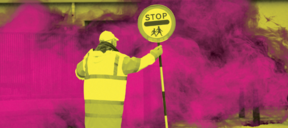‘It’s endemic’: Prevalence of racism in Irish workplaces at record levels
Incidents of discrimination at work quadrupled last year, according to latest figures from the Irish Network Against Racism.
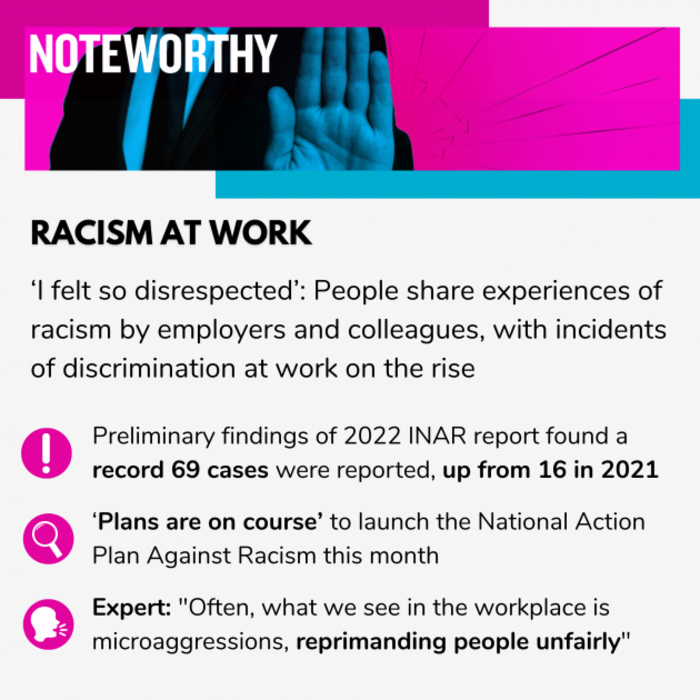
—
EDENNA* HAD JUST turned up for work one morning when his manager beckoned to him for a chat.
Thinking it was one of the usual briefings before the start of a new project, he walked briskly into his office.
“I got there and he told me quite bluntly that I was smelling. It was so out of the blue. He said other workers had made complaints about me, so I needed to clean up myself.
“That was the first time someone had ever questioned my hygiene. I felt so disrespected but I was the only black person in that company and I knew what it was about.”
- Noteworthy, the crowdfunded community-led investigative platform from The Journal, supports independent and impactful public interest journalism.
Edenna had just started working in a mid-level position at the medical device manufacturing company when it happened.
It was one of his first jobs in Ireland after moving from Nigeria to pursue a master’s degree in supply chain management at a university in Dublin.
He said that before this, he had no idea the level of discrimination that existed in his workplace, but quickly found out “from the first day” he joined the company, with one criticism after another from his manager.
Edenna is not alone.
Racism at work is on the rise, new figures from the Irish Network Against Racism (INAR) show.
Preliminary findings from their 2022 report found a record 69 cases were reported, up from 16 in 2021. These figures, released to Noteworthy, related to discrimination in the workplace by colleagues or employers.
A further 30 cases reported involved racist abuse at work by a customer or service users, up from just one in 2021.
INAR releases a report annually in March with data compiled through an online reporting system, iReport.
“We have found out that the two categories of people who experience racism in the workplace and report it are black bus drivers and black taxi drivers but we believe there are many cases that go unreported.
“Part of the reason is that many people don’t know what their rights are,” said Dr Lucy Michael, sociologist and co-author of INAR’s annual report.
“You would think work environments are places where people are of their best behaviour but it’s not really true.”
Ireland also fares poorly when compared to other European countries. Research by the European Union Agencies for Fundamental Rights found that when it comes to racist incidents in the workplace, Ireland ranked as one of the worst Europe-wide with a rate of 33%, compared to an average of 24%.
‘Degrading’ treatment by colleagues
Edenna’s workplace was one where people were certainly not on their best behaviour.
Although he has over 10 years’ experience in the manufacturing industry, he said he was constantly sneered at by his manager.
“Imagine someone telling you things like, ‘you claim to be an engineer but you can’t do this and you can’t do that.’ It’s degrading.
“He would say things to me that he never said to my white colleagues. He would berate me in front of them – just to humiliate me,” said Edenna.
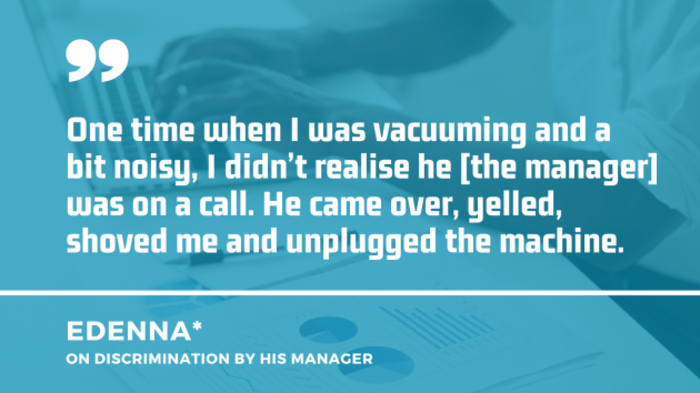
His manager’s behaviour was “quite surprising”, he added, as “sometimes a few seconds after condemning me and appearing to be angry, he would turn to the other white staff and start cracking jokes”.
When he joined, the company refused to train Edenna which was against his contract.
“Initially I gave the company the benefit of the doubt and never thought it was racism. I would say, ‘it’s a new job, maybe I’m the one that needs to improve.’ So, I started spending more hours at work to learn and adapt but nothing changed.
“But when a new person who was Irish joined the company, I saw the level of support he got. It was then I concluded the manager didn’t like the colour of my skin. There were times where I made mistakes and it seemed like my competence was questioned but if a white person did the same, it was seen as ‘just a mistake’.”
A 2018 study by the Economic and Social Research Institute (ESRI) revealed that black non-Irish were more than twice as likely to experience workplace discrimination.
“It’s endemic, it’s institutional,” Dr Ebun Joseph, a lecturer on Black Studies at University College Dublin told Noteworthy.
“It may not always be racist name calling. Often, what we see in the workplace is microaggressions, reprimanding people unfairly and silly behaviours.”
This was also found in a new report released this week by the Irish Human Rights and Equality Commission (IHREC). It stated that “being exposed to microaggression on an everyday basis made some participants leave their workplace”.
Dr Joseph said that she gets calls from people every day in relation to discrimination at work.
“A case that comes to mind is a complaint made by a senior level staff member who was being micromanaged. How can you tell a staff [member] who has rose up to management level that they always have to send you an email before they send it to anybody else?”
‘The feeling of not being seen or celebrated’
Bella* is a case management worker in the social care sector who works with homeless people, disabled people and asylum seekers. She is the only person of colour working in a department of people who are mostly Europeans.
Bella says she has “seen things that has left her feeling excluded and belittled”.
“The organisation has a culture of celebrating staff who get promoted. So, we get cards signed for the staff, write lovely messages and have parties. When it was my turn, I got nothing. Absolutely nothing was done for me,” she said.
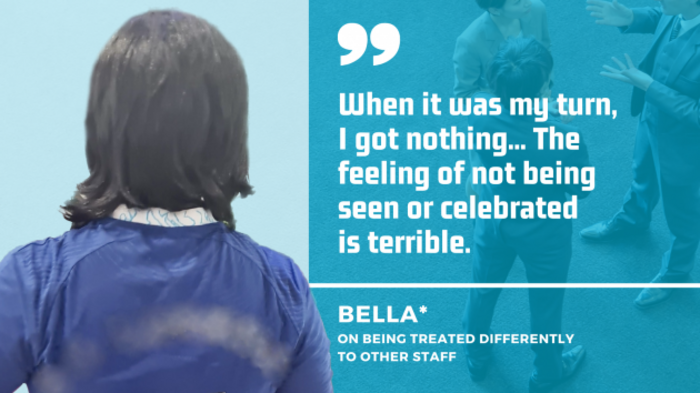
In her previous role as a project worker, Bella’s day-to-day job involved helping clients set up hospital appointments and referring them to organisations that provide support. She said she has faced discrimination from her clients.
“One day I was doing my job helping these people and one of them walked up to me and told me to go back to my country, that I’m taking their jobs. I was dumbfounded, I just didn’t know how to react,” she said.
“The ironic thing is, this person’s kids live in Canada. How would she feel if someone said the same to her kids?”
Bella said she filed an incident report but no action was taken.
Commenting on both Edenna’s and Bella’s allegations, a spokesperson for the Irish Business and Employers Confederation (Ibec) said:
“We cannot comment on individual member companies. Ibec is a strong supporter of equality in the workplace, and it is our practice to always advise and support employers in applying and adhering to equality and all other employment rights legislation in their organisations.”
‘Employers untouchable’
In Ireland, protection against discrimination on nine grounds, including race, is legislated for by two laws: the Employment Equality Acts 1998-2015 for employment-related areas; and the Equal Status Acts 2000–2018 for the provision of goods and services, accommodation and access to education.
Claims of racial discrimination can be made to the Workplace Relations Commission (WRC) – the independent State agency responsible for industrial relations in Ireland.
A recent study by Free Legal Advice Centre (FLAC) and INAR shows a significant drop in the number of cases taken to the WRC since 2016, with fewer claims made under the Employment Equality Acts when compared to the Equal Status Acts.
Funded by the European Union, the ‘Equal Access Project’ examined access to justice for people subjected to discrimination on the basis of race or membership of the Traveller community. It explored the effectiveness of the current infrastructure available to victims to make complaints and to seek remedies.
The report found a massive lack of awareness of equality rights and mechanisms, delay in filing a claim, lack of legal representation, fear of losing one’s job and inability for victims to prove the case can be barriers to the system.
“We did a focus group recently with young black Irish people between 20 and 30 and only one of eight knew there were employment equality laws that protected them. That’s problematic,” said sociologist Dr Lucy Michael.
She said that employers can hinder WRC cases. “A claim of discrimination or harassment in the workplace by either employers or other staff members must be referred to the WRC within six months from the incident but an employer has to be notified first.
“So, the victim would need to ask the employer for certain information which will assist when referring the claim. Without fulfilling this requirement, no case can be looked into. But because some employers know this, they spend more than six months ‘investigating’ an incident and such delay can make a case fail.”
Cases can fail for a number of reasons, Dr Michael added. “There are also instances where victims who quit their jobs can’t afford the cost of legal representation. Others would rather not go to court because they are afraid they won’t get another job if a new employer finds they took their last employer to court.”
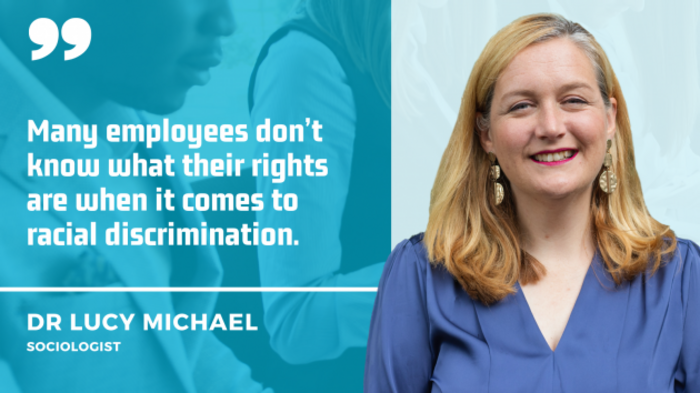
Dr Joseph agreed: “Employers are untouchable. Nobody questions them. Far too many people wouldn’t take the legal route because they want to protect their jobs.
“The support is just not there. Even the few ethnic minorities in senior positions who could help may want to protect themselves.”
When Edenna tried to report the prejudice he faced to a more superior staff, he got the cold shoulder.
“The Director of the company made me feel like I was the one causing trouble. It almost felt like ‘you only just started the job and you are complaining’,” he said. “People don’t realise how difficult it is to prove discrimination. With no support, you don’t have a chance.”
The burden of proof “should be on the employers and not the employees”, Dr Joseph said. “They should be the ones to prove they aren’t racists.”
She also advocates for whistleblowers protection. “Organisations have to put in place system to ensure racist victims are protected.”
‘For many, diversity is only a buzzword’
There is evidence to show that race plays a key factor in recruitment, promotion and labour market experiences in Ireland.
Dr Joseph’s research examining racial stratification in the Irish labour market revealed that skin colour, foreign sounding names, accents and nationality were among the main reasons people experience discrimination.
Another survey conducted by the African Professional Network of Ireland (APNI) found that half of black professionals working in Ireland believe their ethnicity has negatively impacted their career opportunities and career progression.
In the 2016 census, black Africans recorded the highest unemployment rates at over five times that of Western Europeans. For Nigerians, it is 43% and for Congolese, it’s 63% – the highest of any group.
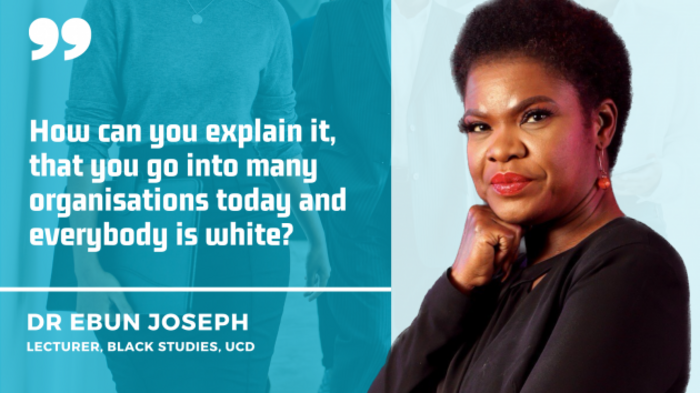
Dr Joseph asked: “Are you saying these organisations can’t find black people to do even admin jobs?”
She did note that more organisations are showing interest in making their recruitment processes inclusive to all communities, but for many, diversity is only a buzzword, she added.
“A lot of companies do it just to have a good public image. It would be nice to see a more genuine effort to be diverse and inclusive which should be reflected in the core of a company’s daily practices.
“For instance, I have observed that many companies’ unconscious bias training is watered down and ineffective. You can’t just organise an hour-long training for your staff and that’s it for the next five years. How do expect people to become anti-racists just like that?”
For many people of ethnic minority backgrounds who get into employment, discrimination could come in the form of wage gap and poor working conditions.
“African nationals have a very low employment rate and when in work, they earn on average 14% less than Irish nationals, after accounting for background and job characteristics,” a recent ESRI report found.
According to the research, pay gaps exist because foreign workers are generally more likely to be found in lower quality jobs and less likely to work in professional or managerial professions – 33% compared to 44% of Irish nationals.
‘Tied to one job’
Bandama* moved from East Africa to Ireland in 2020 for what he describes as a better life.
He works in the agricultural sector and is on a General Employment Permit – which is issued by the State to attract third country nationals for occupations experiencing a labour or skills shortage.
Unlike the Critical Skills Employment Permit holders, Bandama says he is being denied certain rights.
“Currently, I don’t have freedom to change my employer, which means I am tied to one job for five years. I can’t bring my wife and son here either. If I do, they can’t work.”
Bandama, who describes his experience working on a farm as a nightmare, claims he is being exploited at work because of his visa status.
- Our recent Hands on Deck investigation into exploitation of migrant workers in the Irish fishing sector also identified issues relating to work permits. The series can be read here.
“I signed up for 39 hours of work a week but they are making me do 60 hours without extra pay. My job entails lifting a lot of heavy equipment and I have to do that six days in a week and get a day off.
My European colleagues are not on these permits so can afford to leave the job at any time but I’m stuck,” said Bandama.

When Noteworthy put Bandama’s allegations to the Irish Farmers Association (IFA) – who represents the interest of all sectors of farming – it did not respond in time for publication.
In December, Migrant Rights Centre Ireland (MRCI) reported that it has seen a huge increase in workers on General Employment Permits.
However, a bill which aims to modernise the employment permit system is currently before the Dáil.
When enacted it may give general work permit holders fairer conditions including the ability to change employer more easily.
Racism legislation in progress
In Ireland, racism is still not explicitly recognised as a crime. Currently, legislation to prevent and combat racist violence and crime is not as clear and effective as it could be, according to experts that Noteworthy spoke to.
However, the Criminal Justice (Incitement to Violence or Hatred and Hate Offences) Bill 2022 aims to change that.
Ireland has the Prohibition of Incitement to Hatred Act 1989, but it has been widely considered ineffective, with only 50 prosecutions in the more than 30 years since it was enacted.
The new legislation will criminalise any intentional or reckless communication or behaviour that is likely to incite violence or hatred associated with certain “protected characteristics”.
The bill includes 10 protected characteristics including race, religion, gender and disability, with the penalty for offenders of up to five years’ imprisonment.
In addition, in 2021, Minister for Children, Equality, Integration and Youth, Roderic O’Gorman, committed to the development of a far-reaching National Action Plan Against Racism (NAPAR) in line with European standards, following an interim report of an independent anti-racism committee.
Despite a commitment to publish NAPAR by 2022, the Government hasn’t followed through with the implementation.
A spokesperson for the Department of Equality told Noteworthy that “plans are on course to launch NAPAR” this month.
With the recent wave of anti-immigration protests and rise of the far-right, Dr Joseph welcomes new strategies that would tackle racism and prejudice in the State.
“Both the hate crime legislation and NAPAR are welcome in the present climate. My worry though is that will it be policed?
“Racism is more than 500 years old. Sometimes people underestimate the impact it can have on people. It’s one of the leading causes of death among black people.”
*Names have been changed
—

By Joseph Okoh for Noteworthy
Our RACISM AT WORK investigation was proposed and funded by readers of Noteworthy, the crowdfunded investigative journalism platform from The Journal.
Please support our work by submitting an idea, helping to fund a project or setting up a monthly contribution to our investigative fund HERE>>




